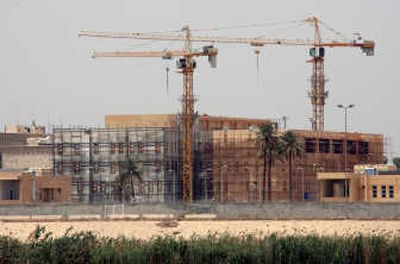Safety concerns surround embassy in Iraq

WASHINGTON – The firefighting system in the massive $736 million embassy complex in Baghdad has potential safety problems that top U.S. officials dismissed in their rush to declare construction largely completed by the end of last year, according to internal State Department documents, e-mails and interviews.
Some officials assert that in the push to complete the long-delayed project, potentially life-threatening problems have been left untouched.
“This is serious enough to get someone killed,” said a State Department official, who spoke on the condition of anonymity because he feared retaliation. “The fire systems are the tip of the iceberg. That is the most visible. But no one has ever inspected the electrical system, the power plant” and other parts of the embassy complex, which will house more than 1,000 people and is vulnerable to mortar attacks.
Other sources involved in the project, also requesting anonymity, insist that disputes involve technical paperwork issues, largely because the contractor had never built an embassy and did not realize that under State Department rules it needed approval for substituting certain materials. Now, much of that work needs to be re-examined and checked, they said, substantially delaying the project’s completion.
The finger-pointing over fire safety is a microcosm of the suspicion that hangs over the troubled project, which is built on acreage almost four times the size of the Pentagon. Originally expected to be completed by July 1, 2007, at a cost of $592 million, the largest U.S. diplomatic mission in the world has been plagued by poor planning, shoddy workmanship and design changes that have added to the cost. The Justice Department is conducting a criminal investigation of the contract and related subcontracts, sources said.
Patrick Kennedy, the undersecretary of state for management, said he was aware of the fire-safety concerns. He said that although the project manager determined last month that the facility is substantially complete, it will not be considered finished until Kennedy signs the certificate of occupancy.
Kennedy said that the fire system, “as installed, did not meet specifications” and needed to be fixed, and that so far only the main underground water lines have been certified. The rest of the fire-suppression system is still being examined, he said. “That’s why we do these final inspections and accreditations,” he said. “You check and you check and you check.”
Some of the problems became apparent when plastic pipes burst during an underground water-pressure test last fall. The pipes had been installed by First Kuwaiti General Trading & Contracting, the firm in charge of building the embassy compound. State Department fire-safety experts said the failure highlighted a cascade of problems in the embassy’s fire-suppression system that would take months to fix, including replacing the plastic pipes with cast-iron ones.
The plastic pipes were ripped out and replaced, and top officials then turned to an outside consulting firm for a reassessment, State Department documents show. When that consulting firm uncovered additional problems in October and November, top officials involved in the project tried to whittle down the list of possible repairs. First Kuwaiti then hired its own consultant to assist with the testing.
Just days before he resigned from the State Department, retired Maj. Gen. Charles Williams, the head of State’s Overseas Building Operations, initialed a key document on Dec. 12 certifying that the water system was working properly.
The Justice Department probe is said to focus on James Golden, a contract employee who oversaw the project, and Mary French, the project coordinator based in Baghdad, according to sources and congressional testimony. Both Golden and French were viewed by many at State as resistant to questions, and both have left the project in recent weeks. Officials in Washington and Baghdad said their departures have greatly improved the atmosphere for the final inspections.
Golden did not respond to e-mails, and French declined to comment. A spokesman for First Kuwaiti also declined to comment, citing restrictions under the company’s contract. During construction of the project, the company has faced allegations of poor building and labor practices.
As early as October 2006, State Department fire inspectors raised concerns about the embassy’s alarm and sprinkler systems. Several sources said the inspectors were denied permission to reinspect the systems after Golden and French assured them that the problems had been fixed.
Then, in September 2007, the pipes burst during a pressure test, and the inspectors discovered that many of the problems they had identified had been ignored. The inspectors documented hundreds of violations of the contract specifications and of fire codes and regulations, according to portions of the report made public by the House Oversight and Government Reform Committee in October.